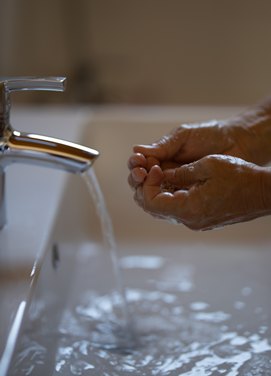Everyone likes to feel clean and comfortable, but if this can be especially important if you’re undergoing treatment for cancer. If you’re being treated with chemotherapy, radiotherapy or surgery, your doctor or consultant may have spoken to you about the importance of helping to keep your body free of any harmful bacteria, germs and viruses.
During treatment and for a time afterwards, your immune system isn’t as robust as usual. Treatment can leave your body unable to fight off bacteria, germs or infection the way it may normally be able to do. Also, your skin will often be more delicate and prone to injury. So, it might need a little extra help and care.
In this article, we’ll go through some helpful tips on how you can best maintain your personal hygiene through and after your treatment. We’ll include the latest advice, as well as tips from the Live Better With Cancer Community Forum.
Our bodies and bacteria
Everyone’s bodies harbour certain bacteria, fungus and microbes as part of the natural flora of our skin. They usually live harmlessly on our bodies, especially in damp areas or places where we most often sweat, such as under our armpits, in our mouths, nasal passage and our genitals. This bacteria isn’t bad for you, but in some cases like when your immune system is weakened, your body may not respond as it usually would – causing infection or other complications.
In addition to the natural fungus and bacteria you carry, many will also regularly come into contact with bacteria or germs outside of your body. This could be through contact with other people, or touching objects that have been touched by someone else.
Luckily, there are plenty of things you can do to take extra care of yourself during treatment, most of which you may already do!
Tips on what you can do to maintain personal hygiene during your cancer treatment
Hands and skin
To prevent bacteria or viruses we come into contact with entering our mouth, nose or eyes it’s important to wash hands regularly with an antibacterial hand wash. Treatment can make your hands and skin feel more sensitive and drier than usual. To combat this, try moisturising after washing your hands.
Tip: Use moisturisers regularly throughout the day. This will help keep your skin hydrated. Avoid products that are heavily perfumed or contain lanolin. Instead, choose colourless products or products developed especially for cancer patients.
- Wash your hands regularly for 20 seconds with an antibacterial hand wash and encourage friends and family members to do the same
- Moisturise after washing to protect your skins natural barrier
Skincare and bathing
You may notice your skin feels more dry and irritated during treatment. This can lead to openings in the skin where germs and bacteria can get in, causing infection.
Tips to protect against this are:
- Bathing every day using warm, not hot water
- Avoid spas and hot tubs
- Use mild soap such as any available on this site
- Carefully clean feet, groin, underarms and any areas that get sweaty
- Pat skin dry instead of rubbing it
- Use a mild moisturising cream after bathing (available on this site)
- Don’t share towels, toothbrushes or razors with anyone else
- Wash towels regularly and 60 degrees C
For the same reasons, it’s also important to protect your skin from any cuts and scrapes to avoid infection.
Tips to protect against this are:
- Avoid shaving or use an electric razor
- Don’t bite or pick at nails or cuticles
- When gardening, use protective gardening gloves and long sleeve clothing
- Don’t pick spots
- Take extra caution in situations where you could slip or fall
Oral hygiene
As your body’s ability to combat infection may be lowered during treatment, this can lead changes that can affect your mouth including:
- You could be more likely to get an infection in the lining of your mouth
- You can also be more susceptible to an overgrowth of a fungus called candida, which can cause an infection called oral or vaginal thrush. This can happen when the natural balance of microorganisms that live in these areas is disrupted.
- Due to some treatment and medication, small ulcers can form in the mouth. This is called mucositis and can be sore and painful.
- Treatment may also affect your glands, making them produce less saliva than normal causing a dry mouth
Tips to combat this are:
- Do not floss your teeth unless advised by your doctor
- Using a soft-bristled toothbrush
- Changing your toothbrush every 3 months
- Use the mouthwash your doctor or nurse recommends to avoid getting mouth sores
- Use sea salt or plain water mouth rinses, as this will cause less discomfort
- Avoid using toothpicks
- Try to stay away from things that may irritate your mouth: alcohol, tobacco, spicy food, garlic, onion, vinegar, crunchy foods, and acidic drinks.
- Keep your lips moist by using lip balm
- Try to drink at least eight glasses of fluid a day
- Check your mouth daily for redness, swelling, sores, white patches, or bleeding, and let your doctor or nurse know if any of these signs of infection are present
- Try to drink at least eight glasses of fluid a day
by Carly Klineberg

